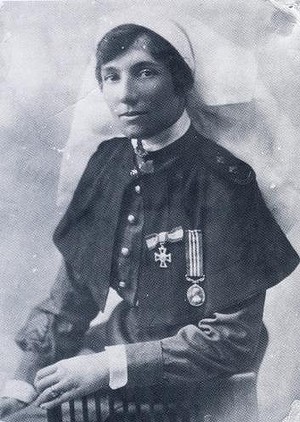Alice Ross-King facts for kids
Quick facts for kids
Alice Ross-King
|
|
|---|---|
 |
|
| Birth name | Alys Ross King |
| Born | 5 August 1887 Ballarat, Victoria, Australia |
| Died | 17 August 1968 (aged 81) Cronulla, New South Wales, Australia |
| Buried |
Fawkner Crematorium and Memorial Park
|
| Allegiance | Australia |
| Service/ |
Australian Army |
| Years of service | 1914–1919 1941–1947 |
| Rank | Major |
| Unit | Australian Army Nursing Service Australian Army Medical Women's Service |
| Battles/wars | First World War Second World War |
| Awards | Associate Royal Red Cross Military Medal Mentioned in Despatches Florence Nightingale Medal Victorian Honour Roll of Women |
| Spouse(s) |
Sydney Theodore Appleford
(m. 1919; died 1958) |
Alice Ross-King (born Alys Ross King, later Alice Appleford) was an amazing Australian nurse. She served in both the First World War and the Second World War. Many people say she was Australia's most decorated woman.
During World War I, she worked in hospitals in Egypt and France. She was one of only seven Australian nurses to win the Military Medal for being very brave. In World War II, she had an important leadership role in the Australian Army Medical Women's Service. In 1949, she received the Florence Nightingale Medal. This is the highest award given by the International Committee of the Red Cross.
Contents
Early Life and Training
Alice Ross-King was born in Ballarat, Victoria, Australia, on August 5, 1887. Her birth name was Alys Ross King. Her family later moved to Perth. Sadly, her father and two brothers drowned in an accident. After this, Alice and her mother moved to Melbourne.
Alice trained to be a nurse at The Alfred Hospital in Melbourne. By 1914, she was a skilled theatre sister. This meant she was experienced in helping during operations.
Serving in the First World War
Soon after World War I began, Alice joined the Australian Army Nursing Service (AANS). She changed her name from Ross King to Ross-King. This helped avoid confusion with another nurse named Alice King. It also made her first name easier to spell.
In November 1914, Sister Ross-King went overseas to Egypt. She worked with the 1st Australian General Hospital (1st AGH) near Cairo. Later, she helped wounded soldiers from the Gallipoli Campaign at a special station in Suez. Towards the end of 1915, she returned to Australia. She helped care for injured troops on their journey home.
Alice returned to the 1st AGH. In April 1916, her unit moved to France. They set up in Rouen. Alice nursed there through 1916 and 1917. This included caring for soldiers from the Battle of the Somme.
In July 1917, she was sent to the 2nd Casualty Clearing Station (2nd CCS). This was a hospital close to the front lines. Just five days after she arrived, on July 22, 1917, the hospital was bombed. Four men died and 15 were hurt. Alice had just finished her shift. But she immediately went back to help. She kept caring for patients even though the canvas tents had fallen on her.
Her brave actions during and after the bombing earned her the Military Medal. She was one of only seven AANS nurses to receive this award during the war. Three other nurses from the same hospital, Dorothy Cawood, Clare Deacon, and Mary Derrer, also received the medal for their bravery during the same raid. General William Birdwood presented them with their medals.
Alice Ross-King stayed with the 1st AGH until the war ended. In May 1918, she was also recognized with the Royal Red Cross award. She was officially discharged from the AANS in September 1919.
Life After the First World War
During the war, Alice met an officer named Harry Moffitt. They got engaged, but sadly, he was killed in July 1916.
On her way back to Australia in 1919, Alice met Dr. Sydney Appleford. They got married in August 1919. They settled in Lang Lang, Victoria, and had four children together.
Serving in the Second World War
Between the two World Wars, Alice Ross-King helped train people for the Voluntary Aid Detachment (VAD). These were volunteers who helped in hospitals.
When World War II started, Alice joined the VAD again. In 1942, the Australian Army Medical Women's Service (AAMWS) was created. Alice was given the rank of Major. She became the senior assistant controller for Victoria. This meant she was in charge of all AAMWS members in that state.
Alice continued to serve in the AAMWS until 1951. In 1949, she was one of two Australian nurses to receive the Florence Nightingale Medal. This is a very high honor for nurses worldwide.
Later Life and Legacy
Dr. Appleford, Alice's husband, passed away in 1958. Alice Appleford spent her last years in Cronulla, New South Wales. She died on August 17, 1968.
Recognition
Since 1970, an award called the Alice Appleford Memorial Award has been given each year. It goes to a deserving member of the Royal Australian Army Nursing Corps.
In 2008, a book called The Other ANZACs (later Anzac Girls) was written by Peter Rees. It told the story of Alice Ross-King's experiences in World War I. This book was later made into a TV series called ANZAC Girls in 2014. Actress Georgia Flood played Alice Ross-King in the show.
Also in 2008, Alice Appleford was added to the Victorian Honour Roll of Women. This recognized her important contributions.

